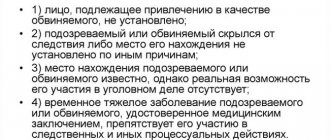Criminal case: concept
What is a criminal case? It starts when identifying signs that may indicate a crime. The algorithm of actions of inquiry and investigation is described in the Code of Criminal Procedure of the Russian Federation.
A criminal case is subject to trial after the investigation has collected sufficient evidence that the person is guilty. When passing a sentence, the judge relies on materials collected by law enforcement officials.
Deadlines for reviewing materials
According to the Code of Criminal Procedure of the Russian Federation, documentation significant for the criminal case is considered:
- Resolution on the initiation of criminal proceedings. This stage presupposes the presence of a suspect, but there are no charges yet and the collection of evidence is required.
- Resolution on transferring a suspect to the status of an accused. At this stage, rights and responsibilities are explained, an interrogation is carried out, since employees of the investigative agency must prove that a specific citizen committed a crime.
- The indictment is the key document, after which the accused must be familiarized with the case materials and these actions must be recorded in the protocol. This document includes a descriptive and operative part, and is also accompanied by a list of citizens required to be summoned to a hearing to consider the case in court. Attached are certificates of material evidence, the existence of a civil claim, measures taken to secure this claim, confiscation of property, legal costs, etc.
In this regard, the period of familiarization with the case materials is virtually unlimited.
Also read: Let's consider in detail Article 158 of the Criminal Code of the Russian Federation with comments
Video about the timing of criminal proceedings
From this material you learned what the deadlines for initiating criminal proceedings are. In most cases, this period is 3 days, but if the investigation becomes more complicated, it can be extended to 10 or 30 days to clarify all the circumstances. The time frame for initiating criminal proceedings is clearly regulated. The basis for starting a case is an application and a decision to initiate a case.
Reasons for initiating a criminal case
The first stage of criminal proceedings begins with the fact that the authorized bodies learn that a criminal act is being prepared or has actually been committed. They are informed about this
Accordingly, at this stage one of the decisions is made:
- Institute proceedings.
- Refuse.
- Pass it on in sequence in accordance with Art. 151 of the Criminal Code, if it concerns a private accusation, then go to court.
In order for a case to be initiated, grounds are needed. They accept information that indicates an offense has been committed. Law enforcement agencies must check it and make one of the decisions listed above.
Previously, the Code of Criminal Procedure of the Russian Federation established criminal cases as grounds for initiating criminal proceedings. The following circumstances are listed in Article 140:
- point 1: filing a statement: it states a crime.
- part 1, part 2: a person came to confess to a crime - surrender.
- Part 1, paragraph 3: notification of an offense, as well as that it is being prepared.
Further, in 2007, No. 87 - Federal Law was adopted, which introduced changes to certain legal acts. And the list of the Criminal Procedure Code on the grounds for initiating a case was supplemented with paragraph 4. It states that the prosecutor’s decision can become the basis for the start of criminal proceedings.
In 2010, the law was changed again. They were associated with N 404-FZ. The final version of this regulation states that the prosecutor’s duties do not include initiating a criminal case!
Prosecutor's resolution
The prosecutor works with applications and appeals from citizens. In the process, he may encounter facts that indicate the presence of signs related to a crime in a particular case. This also includes materials drawn up based on the results of personal observation of an official in a situation where he himself witnessed an unlawful act.
In 2010, changes were made to the Code of Criminal Procedure. They touched upon the competence of the prosecutor regarding the issue of initiating criminal cases. Thus, paragraph 2 of Art. 37 Code of Criminal Procedure. The norm of the article establishes the nature of cooperation between law enforcement agencies and the prosecutor's office at the stage of initiating a criminal case.
The prosecutor at the first stage of criminal proceedings has the powers:
- control over compliance with the requirements for receiving and registering notifications of crimes;
- making a decision: according to the document, the materials are transferred to the investigation, inquiry in order to make a decision on the criminal prosecution of the culprit;
- checking the legality of decisions of officials related to the initiation of criminal proceedings. affairs;
- notification of a crime and transmission of a message from one authority to another (Article 151 of the Code of Criminal Procedure);
- removal of materials about a crime from the preliminary investigation.
These powers are limited by the fact that under Art. 146, part 1, among the initiators of the procedure to initiate a criminal case, the prosecutor is not on the list. This means that he is deprived of the right to initiate criminal proceedings. It is possessed by the inquiry, the investigation, the head of the investigation department and his subordinate. The prosecutor supervises the work of these persons, but cannot initiate a case on his own.
The prosecutor cannot single-handedly decide to initiate a criminal case
Report a crime
The decision that a criminal case should be initiated is made by the inquiry and investigation. The duty of officials is to accept a report of a crime committed, as well as one that is prepared within 3 days from the date of notification of this. The period for consideration of a criminal case is 14 days from the moment the court makes a decision that a trial is necessary regarding the guilt of a specific person or group of citizens.
The message is checked, and during this process officials receive explanations and request documents and samples used for comparative research.
In addition, during the inspection, the inquiry and investigation authorities:
- order an examination;
- take part in its production;
- analyze the expert opinion;
- inspect the place where the unlawful act was committed;
- conduct an inspection of crime items, etc.
The actions of officials are called procedural: but third parties also take part in them. They are explained their rights and responsibilities. For example, a person has the right not to testify against himself, as well as against persons who are related to him by blood.
In addition, he has the right to involve a lawyer in the case and complain about the actions or inactions of law enforcement officials. Participants may be aware that they may not disclose information relating to the proceedings before the case goes to trial.
Confession
Confession may serve as a reason to initiate criminal proceedings if the crime was not previously known
A confession occurs when a person tells law enforcement that he has committed or participated in a crime. The condition for surrender is the voluntariness of notification of the offense during the inquiry and investigation.
A confession is the basis for initiating a criminal case if the information that becomes known is of a primary nature. In this case, it is a reason to initiate a case. Otherwise, if another reason has already been registered (for example, a statement received from an eyewitness to an illegal act), the case has been initiated, confession is not such a reason.
Confession has another meaning for a person. This is a circumstance that can mitigate his punishment, and also, in cases specified in the Code of Criminal Procedure, exempt him from liability. In addition, according to Art. 99 of the Code of Criminal Procedure, attendance is taken into account when choosing a preventive measure, and indicates that the person has repented (Article 28 of the Code of Criminal Procedure).
Reporting a crime
According to Art. 141 of the Code of Criminal Procedure it can be done in any form. The written statement is signed by the person who came to report that a criminal act has been committed. If the message is transmitted orally, it is recorded in the protocol, which is signed by the applicant. The document reflects his data, as well as information about his documents.
The applicant is warned that he is responsible for transmitting to the authorized bodies information that is knowingly false. This is established in Art. 306 Code of Criminal Procedure of the Russian Federation.
IMPORTANT: since the identity of the applicant is identified when submitting a statement about an offense, the law excludes the initiation of a criminal case based on information from an anonymous source.
Time frame for the investigation
The moment to open a case and conduct an investigation is the order to initiate criminal proceedings. For the category of cases of private and private-public prosecution, a written statement from the victim or his legal representative is required. The standard period for carrying out preliminary investigation measures is 2 months from the date of commencement of the case, as stated in Art. 162 of the Code of Criminal Procedure of the Russian Federation.
This article also states that the period can be extended:
- up to 3 months in case of a decision made by the head of the investigative agency;
- up to 12 months if special difficulties arise during the investigation process;
- for a longer period, if there are substantial grounds, by the chairman of the investigative body of the Russian Federation, the heads of investigative departments and their deputies.
All measures during the preliminary investigation must be recorded in the protocol. At the moment when a decision is made to bring a citizen to justice as an accused, he is reclassified to a different status - from a suspect to an accused. Until this moment, he was in a pre-trial detention center or at large, at this stage he is summoned and charged under a certain article. These stages take place within 2 months from the date of initiation of the proceedings.
The algorithm of actions is as follows:
- after the initiation of a case, a preliminary investigation and collection of evidence is carried out;
- issuing a resolution on assigning the status of an accused to a citizen, the resolution must indicate the date and place of formation of the document, the data of the responsible person and the accused, a description of the criminal act with all significant circumstances must be indicated, the article of the Criminal Code of the Russian Federation, under which the corresponding penalty is prescribed, must also be stated on considering the subject as an accused;
- within 3 days, the accused must be notified of the issuance of an order by the administration of the detention center or a summons for interrogation;
- in the presence of a lawyer, charges are brought against the accused and his rights are read out, after which both the lawyer and the accused put their signatures on the resolution; if the citizen refuses to sign, a corresponding note is made to this effect;
- the accused and his lawyer are given a copy of the document, it is also sent to the prosecutor, then the accused is interrogated under Art. 173 of the Code of Criminal Procedure of the Russian Federation, during which a protocol is drawn up; in case of refusal of interrogation, a note is recorded;
- then the collection of evidence is carried out to confirm the accusation (inquiries, collection of witness statements, examinations and examination of the location of the criminal act);
- After collecting evidence, a conclusion of the prosecution is drawn up, and investigative measures are stopped and the next stage of paperwork begins.
Grounds for initiating criminal proceedings
The list of grounds on which authorized persons have the right to initiate criminal cases is determined by the Code of Criminal Procedure, an exhaustive list. This means that only the Federal Law can make changes to it.
- Art. 140, paragraph 1: information in any form, it reports a crime.
- Art. 140, part 1, point 2: confession.
- P. 140, part 1, clause 3: notification of an offense, as well as that it is being prepared.
REFERENCE: the duties of the prosecutor do not include initiating a criminal case.
Procedural issues
The initiation of a criminal case necessarily goes through the third stage; the concept and meaning is associated with the need to monitor the legality of the activities of the law enforcement system. This work is performed by the prosecutor's office as part of its supervisory function. The relationship method is as follows:
- The corresponding decision is transmitted to three procedural persons: the prosecutor, the author of the application and the suspect immediately.
- The prosecutor's office checks the data contained in the document to identify procedural and legislative violations. In particular, the availability of the following data is checked: date, time and place of the issuance, reason and grounds, legal qualifications.
At the start of criminal proceedings, prosecutors are given 24 hours to study the text and the motivating part of the refusal. If violations are detected, this law enforcement body has the right to cancel the decision to initiate criminal prosecution (Article 37 of the Code of Criminal Procedure). In addition, the prosecutor may request materials from the initial inspection, if required to make an appropriate decision.
Some criminal cases are dealt with privately. This involves direct appeal to the magistrate. Private prosecution is brought for offenses that do not have qualifying characteristics. An example of such is light beatings, insults, etc. (Article 20 of the Code of Criminal Procedure). Moreover, criminal prosecution, the basis for which was a private accusation, is subject to termination in the event of reconciliation of the parties.
Verification of the circumstances described in the application may lead to abandonment of the criminal procedure. Such a decision is made on the following grounds (Article 24 of the Code of Criminal Procedure):
- the data specified in the application did not take place in reality;
- the act does not fall within the description of the crime;
- the statute of limitations for this type of violation of the law has expired;
- the suspect has died (there are exceptions);
- the victim refused to file a statement (if required by law);
- the competent authority refused to give consent to prosecute a person with official immunity.
Procedural refusal to initiate criminal prosecution has the following consequences:
- is stated by a resolution containing a motivating part (explanation);
- leads to consideration of the issue of initiating prosecution for a false denunciation;
- requires publication of information in the media in respect of which the application was submitted;
- sending a copy of the document to the prosecutor's office within 24 hours.
The legislation requires inquiry and investigation workers to carry out explanatory work with suspects and other participants in the process. They are informed of their legal rights and obligations against their signature.
Who can initiate a criminal case
According to Art. 146 persons strictly defined in law have this right.
| Initiator | Category of cases |
| investigator | by sequence, category – mandatory preliminary investigation |
| interrogator | by sequence, category - preliminary investigation is carried out in the form of an inquiry |
| body of inquiry | according to the sequence, transfer of the case to the inquiry officer or investigator, deadline for transfer ug. cases – 10 days |
| Chairman of the Investigative Committee, acting under the Prosecutor's Office of the Russian Federation | criminal cases against certain persons |
| Head of the Investigative Directorate at the Prosecutor's Office of the Russian Federation | — |
Subjects of initiating criminal cases:
- Bodies of inquiry: Department of Internal Affairs, representatives of executive branch authorities who have the right to conduct operational work, investigators.
- Investigators: persons conducting preliminary investigations into crimes.
Who does not have the right to initiate criminal cases:
- police officers on duty who receive requests from citizens;
- detectives carrying out investigative activities;
- private prosecutors;
- lawyers;
- judges.
REFERENCE: these persons take part in a criminal case within the powers given to them by law! But they do not influence the decision to initiate it.
Who doesn't have this right?
There are groups of persons who take part in the proceedings of a criminal case, but do not have the right to perform actions aimed at initiating it. Here you can specify persons such as:
- duty officers who receive complaints from victims;
- detectives carrying out direct investigative activities;
- private prosecutors and lawyers of the injured person;
- judges who do not have such powers.
Thus, it can be noted that the law establishes a strictly regulated range of persons who have the right to initiate legal proceedings if there are specific grounds.
Procedure for initiating a criminal case
Includes three stages that sequentially change each other:
- Issuance of an appropriate resolution. The document indicates the date, place and time, reason, basis, qualification of the criminal act.
- The prosecutor, the applicant and the suspect are informed that the law enforcement authorities have issued a decision.
- The prosecutor checks the fact of initiating a criminal case against the requirements of legality and validity. He has the right to demand verification materials from the investigation. According to Art. 37, part 2 of the Code of Criminal Procedure, cancel it within 10 days from the moment the criminal case was opened.
What is not considered a reason or reason
Opening a criminal case is the initial independent stage of the process of investigating an offense. It must be carried out in accordance with the law in order to guarantee the validity of the decision made .
If a case is filed or not filed without justification, this means a violation of the law and harm to the interests of citizens, society and the country.
Cannot act as reasons:
- Anonymous statements. However, when the letter contains specific information about the place and time of the incident, it is sent to specialized services for investigation.
- Applications signed by a non-existent name.
- A statement made orally, not recorded in the protocol.
Categories of criminal cases and their features
There are three types of production with specific features:
- for persons under 18 years of age;
- the use of coercive and medical measures;
- a separate category of citizens.
| Category | Examples of articles of the Criminal Procedure Code, Criminal Code | Important nuances |
| minors (persons under 18 years of age) | 172, part 1 173 | The time frame for checking the primary materials of a criminal case is 3 days + 10 (exceptional cases) checking the feasibility of bringing a minor to criminal responsibility; accurately establishing the age of the teenager |
| coercive measures | Art. 99 CC – list of measures | measures are aimed: • not at bringing the person to justice, but at curing him; • to isolate him from society; • ensuring a person’s safety from himself |
| individuals (representatives of 3 branches of government + local government officials) | Ch. 19, 20, 23 Code of Criminal Procedure, Art. 448 Code of Criminal Procedure | these persons are brought to justice as accused with the provision of guarantees under Art. 448 Code of Criminal Procedure; the preliminary investigation is carried out by investigators of the Investigative Committee of the Russian Federation (Article 151, Part 3, Clause 7) |
Main conclusions
- A document requesting to initiate a criminal case must be drawn up only if the applicant is absolutely sure of the guilt of a certain individual;
- The structure of the document is standard - “header”, main part and details;
- The applicant must indicate that he is aware of giving false testimony on the basis of Article 306 of the Criminal Code of the Russian Federation;
- The text of the document indicates the circumstances under which the violation of criminal norms was committed, the place where it occurred, as well as the time;
- The applicant must have evidence confirming that the text he wrote is not unfounded.
Application to initiate a criminal case
The drafting of a document is subject to general rules:
- On the right side, the addressee to whom the citizen is addressing, for example, an investigator, is indicated.
- On the same side, the full details of the applicant are written down.
- In the middle is the name of the document. For example, a citizen may use wording such as “statement of a crime.”
- In the middle of the statement, the circumstances under which the offense occurred are stated. They are presented concisely and concisely. The applicant must list all evidence of the offense available to him.
- In the document, the citizen indicates a requirement to initiate a criminal case.
- The statement contains a footnote stating that the citizen is aware of the responsibility for false denunciation.
- Documents evidencing the crime are attached to the application.
- Adding date and signature.
The application is submitted to a representative of the authorized body.
How reports of criminal offenses are processed
Initiating a criminal case as a procedure begins with obtaining information. This is the same stage of the criminal process, subject to procedural rules. This work is usually carried out by the duty officer of the district office. His responsibilities include:
- receiving information in a way that is convenient for the applicant;
- registration of application;
- initial check and making an appropriate decision.
The duty officer must accept and register any information. Refusal based on inconsistency of the type of act, place of commission or completeness of the information provided is unacceptable. The application goes through the registration procedure, and the citizen is given a coupon containing the number, date and time of reception.
The application is submitted to the investigative body. It is entrusted with the responsibility to carry out verification activities. That is, the tasks of the inquiry, in the context of the second stage of initiating a criminal case, come down to collecting information confirming or refuting the essence of the statement. The methods and content of the work depend on the completeness of the initial information.
During the initial inspection, the body of inquiry uses non-coercive methods of collecting information. These include:
- obtaining explanations from the applicant and witnesses;
- ordering certificates or samples (as appropriate);
- sending a request to organize an audit (if necessary);
- work with documents;
- other activities not related to coercion.
The problems of initiating a criminal case based on information disseminated through the media are dealt with in Article 21 of the Code of Criminal Procedure. Thus, the investigator is obliged to contact the editorial office of the relevant media outlet and request information about the identity of the informant. However, the head of the publication is given the right to refuse to disclose personal information if such a requirement was a condition of the transaction.
During the initial inspection, a general description of the offense is drawn up. At this stage of initiating a criminal case, it is necessary to resolve the issue of whether there are signs of a crime in the event specified in the statement. An exact qualification of the offense is not required. A specific article may be changed (reclassified) during the course of the investigation.
After completing the verification activities, a decision is made:
- about the initiation of a case against a person or in fact;
- about a reasoned refusal;
- on the transfer of materials according to jurisdiction or jurisdiction.
Hint: The applicant is informed of the decision in writing.
Who can decide to open
The procedure for initiating a criminal case can be carried out by the following persons:
- the investigator who received information about the crime;
- interrogator;
- bodies of inquiry;
- head of the investigative body;
- world judge.
In each region of the Russian Federation, there are law enforcement agencies that operate both investigative units and departments intended for inquiry. Even the Investigative Committee and the FSB may have investigative departments.
Actions after arousal
As soon as the case is recognized as open, the following actions are performed by the investigator and other specialists:
- evidence is collected;
- materials received from witnesses and the victim are checked;
- explanations are collected from all participants;
- the signs of a crime are considered;
- Interrogations and confrontations are conducted if necessary;
- various documents are attached to the case materials, for which purpose seizure and inspection protocols are drawn up;
- A protocol for the inspection of the scene of the incident is drawn up.
Evidence obtained by the investigator can be used in court only if it is properly prepared.
What to do if you refuse
Sometimes the investigator refuses to open cases even if there is an official statement and good reason. Such a decision can be appealed to higher authorities. When drawing up a complaint, it is permissible to point out unlawful actions of officials, which include paperwork or refusal to use different methods to study the circumstances of the incident.
To increase the likelihood of initiating a criminal case, you need to collect as much evidence as possible.
Features of prosecutorial supervision
Prosecutors are required to monitor the procedural activities of law enforcement officers during criminal cases. The powers of specialists are listed in Art. 37 Code of Criminal Procedure. They must monitor the legality and justification of decisions made. This especially applies to the initiation or refusal to open a criminal case. If a decision is made to initiate a criminal trial, a copy of this document must be sent to the prosecutor.
If, after studying the case materials, the prosecutor believes that the decisions taken are illegal or unfounded, then they are canceled by a special resolution. However, there are no exact deadlines for this process.
What to do if the statute of limitations has expired
Criminals are released from criminal liability if the statute of limitations for a specific crime has expired. According to Art. 78 statute of limitations depends on the severity of the act committed. According to Art. 24 of the Code of Criminal Procedure in such cases it is prohibited to open criminal cases, and if the case is nevertheless initiated, it is terminated.
But even in the presence of such a non-rehabilitating basis, a citizen who acts as a criminal is considered to be held accountable. If he does not admit his guilt, then the case will be investigated on a general basis. But even if a person is found guilty, he is released from punishment.









